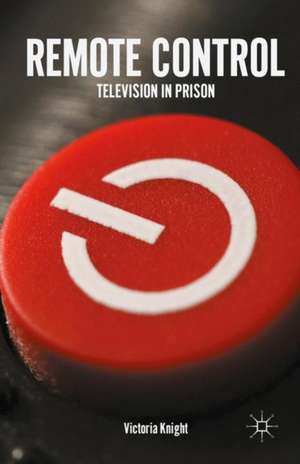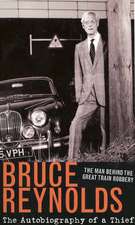Remote Control: Television in Prison
Autor V. Knighten Limba Engleză Hardback – 14 mar 2016
This book uncovers the complex and rich emotive responses to prison life. Dimensions of boredom, anger, frustration, pleasure and happiness appear through the rich narratives of both prisoners and staff, indicating the ways institutions and individuals deal with their emotions. It also offers an insight into the unfolding future of the digital world in prisons and begins to consider how the prisoner can benefit from engagement with digital technologies. It will be of great interest to practitioners and scholars of prisons and penology, as well as those interested in the impact of television on society.
Preț: 389.70 lei
Nou
Puncte Express: 585
Preț estimativ în valută:
74.57€ • 77.05$ • 62.03£
74.57€ • 77.05$ • 62.03£
Carte tipărită la comandă
Livrare economică 20 martie-03 aprilie
Preluare comenzi: 021 569.72.76
Specificații
ISBN-13: 9781137443908
ISBN-10: 1137443901
Pagini: 256
Ilustrații: IX, 253 p.
Dimensiuni: 140 x 216 x 16 mm
Greutate: 0.45 kg
Ediția:1st ed. 2016
Editura: Palgrave Macmillan UK
Colecția Palgrave Macmillan
Locul publicării:London, United Kingdom
ISBN-10: 1137443901
Pagini: 256
Ilustrații: IX, 253 p.
Dimensiuni: 140 x 216 x 16 mm
Greutate: 0.45 kg
Ediția:1st ed. 2016
Editura: Palgrave Macmillan UK
Colecția Palgrave Macmillan
Locul publicării:London, United Kingdom
Cuprins
1. Research Foundations
2. Perspectives on Prisons
3. Prisoner Perspectives
4. Audiences of Television
5. Making Room for In-Cell Television: Access, Availability and Points of Use
6. Personal Control: Television, Emotion and Prison Life
7. Situated and Mediated Control: Managing Souls with In-Cell Television
8. Concluding Discussion
2. Perspectives on Prisons
3. Prisoner Perspectives
4. Audiences of Television
5. Making Room for In-Cell Television: Access, Availability and Points of Use
6. Personal Control: Television, Emotion and Prison Life
7. Situated and Mediated Control: Managing Souls with In-Cell Television
8. Concluding Discussion
Recenzii
"Victoria Knight offers a deeply perceptive and penetrating account of the emotional struggles experienced by male prisoners as they attempt to cope with the extreme demands of their environment. Knight's grasp of the social and psychological forces which burrow into daily existence behind prison doors makes this a challenging and intriguing study." - Derek Layder, Emeritus Professor of Sociology, University of Leicester, UK
"Knight's empirically rich study of television's significance in prison settings makes a distinctive and valuable contribution to the literature on media use in everyday life. In particular, this research is important for its insights into the experiential dimension of prisoners' routines, in which television viewing now plays a vital part." -Shaun Moores, Professor of Media and Communications, University of Sunderland, UK
"This book contributes to the wider debate about the role of digital technology in our prisons. Dr Knight raisessome important issues regarding security, control and the resistance to technology in prisons. However, she also highlights the benefits of digital technologies for prisoners and provides tantalising insights into how technology in prison is evolving, not only in the UK but across Europe and the US." - Anne Pike, Open University, UK
"Knight's empirically rich study of television's significance in prison settings makes a distinctive and valuable contribution to the literature on media use in everyday life. In particular, this research is important for its insights into the experiential dimension of prisoners' routines, in which television viewing now plays a vital part." -Shaun Moores, Professor of Media and Communications, University of Sunderland, UK
"This book contributes to the wider debate about the role of digital technology in our prisons. Dr Knight raisessome important issues regarding security, control and the resistance to technology in prisons. However, she also highlights the benefits of digital technologies for prisoners and provides tantalising insights into how technology in prison is evolving, not only in the UK but across Europe and the US." - Anne Pike, Open University, UK
Notă biografică
Victoria Knight is a Senior Research Fellow in Applied Social Sciences at De Montfort University, UK. She is a member of the Independent Monitoring Board in a local male prison and a member of the editorial board for the Prison Service Journal. She is also convenor of the Emotion and Criminal Justice Cluster at De Montfort University, UK, which brings together scholars and practitioners for cross-disciplinary research and debate into the topic of emotion in the criminal justice landscape.
Textul de pe ultima copertă
In-cell television is now a permanent feature of prisons in England and Wales, and a key part of the experience of modern incarceration. This sociological exploration of prisoners' use of television offers an engaging and thought provoking insight into the domestic and everyday lives of people in prison - with television close at hand. Victoria Knight explores how television contributes to imprisonment by normalising the prison cell. In doing so it legitimates this space to hold prisoners for long periods of time, typically without structured activity. As a consequence, television's place in the modern prison has also come to represent an unanticipated resource in the package of care for prisoners.
This book uncovers the complex and rich emotive responses to prison life. Dimensions of boredom, anger, frustration, pleasure and happiness appear through the rich narratives of both prisoners and staff, indicating the ways institutions and individuals deal with their emotions. It also offers an insight into the unfolding future of the digital world in prisons and begins to consider how the prisoner can benefit from engagement with digital technologies. It will be of great interest to practitioners and scholars of prisons and penology, as well as those interested in the impact of television on society.
This book uncovers the complex and rich emotive responses to prison life. Dimensions of boredom, anger, frustration, pleasure and happiness appear through the rich narratives of both prisoners and staff, indicating the ways institutions and individuals deal with their emotions. It also offers an insight into the unfolding future of the digital world in prisons and begins to consider how the prisoner can benefit from engagement with digital technologies. It will be of great interest to practitioners and scholars of prisons and penology, as well as those interested in the impact of television on society.
















